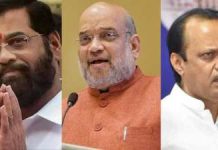
During his two-day visit to J&K, the Home Minister, Rajnath Singh, made all the right noises. He said the centre was ready for talks with all the stakeholders in Kashmir. In an apparent reference to separatist groups, he said that for the dialogue to take place being right-minded was more important than being like-minded. But he stopped short of extending a formal offer to Hurriyat, just what he was anticipated to do. Instead, he once again put the onus of holding a dialogue with the centre on the Hurriyat itself.
“I appeal to people of J&K, for the sake of peace in the state please come forward. It should not happen that one more generation of J&K gets lost in darkness,” Singh said while addressing a press conference in Srinagar. “Dialogue can happen with everybody.”
Similarly, Singh also left things unclear about the extension of ceasefire beyond Ramadhan, another important announcement expected to be made during his visit.
“The suspension of operation is on so far. We will review it,” Singh said. “Any decision will be taken after having all opinions are on board. Don’t rule out any possibility.”
On its part, Hurriyat too didn’t show any signs of revisiting its stance on the engagement, saying it too wasn’t in a hurry to talk and would take its time to discuss and respond.
“If Delhi really cares for our children and young and it’s (call for dialogue is) because of a change in the policy rather than the change of circumstances, then it’s a human gesture and we welcome it,” Hurriyat (M) Chairman Mirwaiz Umar Farooq said at Srinagar’s Grand Mosque. “The best way is to rise above the fixed positions and address the issues through the ambit of humanity and justice.”
The situation thus remains hopelessly deadlocked with both sides choosing to tentatively approach each other rather than directly working out to the mutual terms for engagement. That is easier said than done. More so, for the BJP-led government in New Delhi, this has adopted a hawkish line on Kashmir and banked exclusively on a militaristic approach to quell the resurgent militancy.
Much will depend on how the centre handles the ceasefire, an unpredictable proposition. The truce could witness a sudden withdrawal in case of a successful militant strike, which in turn will kill the chances of the dialogue.
So far, the situation has by and large remained peaceful. Killings of the local militants have come to a halt. Only one soldier and a civilian have so far died in a militancy related incident. More than ten militants have been killed along the Line of Control (LoC) which is not covered by the ceasefire. In its presentation to Rajnath, J&K Police said the truce had been “70 per cent success if not 100 per cent.”
This is unlike the five-monthlong unilateral ceasefire announced by the former Prime Minister Atal Bihari Vajpayee in 2000 during which more than 800 people were killed.
This success has raised hopes of topping up the truce with more confidence- building measures like the talks with Hurriyat. But, despite making a chorus of noises to the effect, the centre is baulking at the prospect. And the reason for this is not far to seek: to bring
Hurriyat on board, the centre would need to make more than dialogue-favouring noises, as is apparent from the former’s lukewarm response so far.
“Making statements in media and expecting us to respond makes no sense,” said a Hurriyat leader.
For the dialogue to come through, the vague statements by the top BJP leaders will thus hardly help. Such indirect signals will have little resonance with the separatists who are loath to be seen as one of the sundry stakeholders in Kashmir and consider themselves to be the sole representatives of the political aspirations of the people. Nor would a general offer of dialogue be sufficient for them to respond positively.
With three major separatist leaders, Syed Ali Shah Geelani, Mirwaiz Umar Farooq and Yasin Malik having formed a united front named as Joint Resistance Leadership, the prospect of a dialogue has become an even more complex affair. While Hurriyat doves led by Mirwaiz feel diffident about taking a much-travelled road, there is hardly any reason for the hardliners to change their worldview. Geelani has built up his current following on the unwavering rejection of engagement with New Delhi.
The hardliner has his own reasons for cynicism. He thinks a formal engagement with New Delhi is nothing but a devious process of diplomatic merry-go-round which doesn’t get anywhere. He is for dialogue with New Delhi but before that wants the centre to acknowledge Kashmir as “a disputed territory”. He also seeks the involvement of Pakistan as a party in a trilateral process between New Delhi, Islamabad and Kashmiris. And to top it all, he also rejects any flexible settlement proposals on Kashmir and insists on UN resolutions on Kashmir to be the starting point for any initiative on the state.
And, the BJP which has an integrationist policy on the state is not in a position to accept there is an issue to be resolved, let alone offer a hope of a settlement. All that the BJP is offering is a dialogue for the restoration of peace.
With nothing substantive in terms of the political resolution coming out of New Delhi, there will be few takers in Kashmir for the potential of a future dialogue to be productive. In fact, some Kashmir observers even think that the talk of the fresh dialogue is designed to address the vacuum that the centre fears have set in following the four-year long militaristic policy.
“What we are witnessing is more a talk of the talks than a search for dialogue. Talking about the talks is an end in itself as it creates a false sense of a political outreach,’’ said Naseer Ahmad, a local columnist. ‘’Therefore, the need to keep the pretension of engagement with Kashmir going.’’
However, the only element that could lend credibility to this talk with the Hurriyat is the restoration of the bilateral dialogue with Pakistan. If the dialogue with the separatists is held as a counterpoint to the talks with Islamabad, this will give the exercise some meaning.
But such a prospect, as of now, looks distant. Pakistan is in already in election mode circumscribing the chance and the space for resumption of talks with India. And, by 2018 end also, the government in New Delhi will have an eye on the 2019 polls, dissuading it from a troubled engagement with its neighbour.
The period thus will hardly be conducive to a purposeful dialogue. But this hasn’t, in any way, lessened the urgency for a political outreach.
“The union government had better speak in unambiguous terms. That is, say it wants a dialogue. Say, it wants it for the resolution of the political issue in Kashmir. Supplant it’s rigidly ideological position on the state with an approach rooted in political realism,” a recent editorial in a local daily stated. “Things will soon start falling in place.”
letters@tehelka.com













